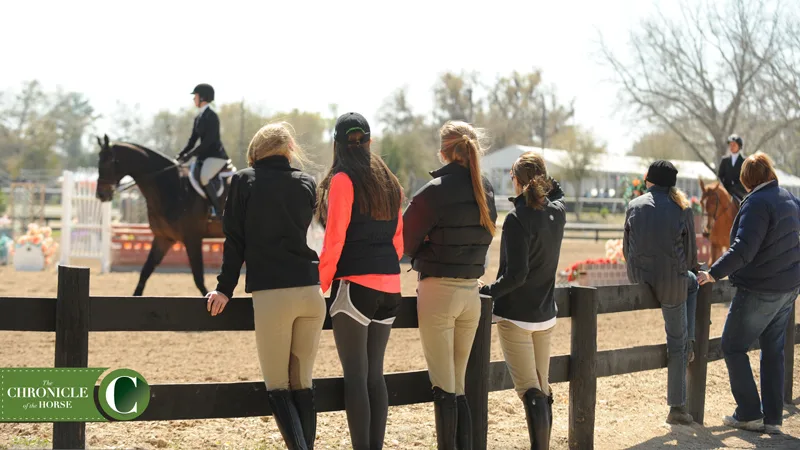There are few things I love more than sitting at a horse show and watching. Sure, I love competing too, but truly, I could sit ringside and just observe class after class, all day long. I obviously love watching my own sport of dressage, but I would be just as happy at a hunter or jumper show or at an event. Stellar dressage tests, clear jump rounds, beautifully executed equitation trips, mistake-laden rounds, classes that go awry—give me any of it, and I’ll gladly follow along. But my draw to horse shows goes beyond the obvious entertainment value and originates in something deeper and more meaningful.
There was a time, in the few years after I graduated college and moved back home, that I was not able to ride much at all, let alone compete. I was lucky enough to have a good network of friends within the horse world still, many of whom were competing, so I seized any opportunity I could to travel to horse shows with them. Though I originally viewed these trips as merely keeping myself involved with horses any way possible, I quickly realized that they could be far more valuable than that. During this phase of my life, I spent hours ringside at horse shows, soaking in as many classes as I could.
I admired the professional riders, with their quiet, effective seats, their steady, forgiving hands, and their painstaking accuracy within their tests. I observed amateur classes, whose participants’ valiant efforts and occasional rider errors were very relatable to me, and took note: so that’s what too much angle looks like in the shoulder-in; that was a well-executed half-halt in the leg yield to slow the shoulders and allow the haunches to catch up. Many concepts that had always seemed somewhat elusive to me were suddenly cemented in my brain as I watched horse after horse, class after class. I picked riders whose positions I really liked and memorized them so I could try to emulate the way they carried their hands or the fluidity of their seat. I tested myself by trying to guess what riders’ scores would be, then checked myself when actual scores were posted. My knowledge and my eye for correctness began to sharpen.

Laura Adriaanse finds watching horses compete to be a free educational opportunity. Mollie Bailey Photo
And so I continued to attend horse shows and watch, even after I eventually got my own horse and began to compete again. I discovered the absolute gold mine that is horse show livestreams and tuned in to whatever I could, whenever I could. I expanded my knowledge outside the dressage world into the hunter, jumper and equitation worlds, listened to as much commentary on livestreams as I could, and soon found myself able to score a hunter round within a few points of the actual judges’ scores. At first, I thought these riding disciplines wouldn’t be as directly applicable to my own dressage, but the softness, smoothness and intricate yet largely invisible communication between the top riders and their mounts are exemplary and exactly what I strive for as a rider.
ADVERTISEMENT
Sure, the “feel” of riding is arguably the most important part of the sport: You can know all there is to know about riding a horse, but if you don’t put it to use, it doesn’t make you a better rider. But it does make you a better horseperson, and it does give you the tools to practice in your own riding. It gives you concrete goals you can break down with your trainers, and it gives you a clear vision of how you would like to perform. I would urge other riders, especially amateurs like myself and junior and young riders, to of course continue to take lessons, but to also go to horse shows without a horse or tune into live feeds. Think about what your trainers have told you, listen to commentators when you can, and soak it in. Pick riders whose style you like, and try to emulate what you like about them. Notice riders who are making errors and make an effort not to repeat them yourself.
Observing horse shows is, quite literally, free education. It has increased my knowledge exponentially at no cost to me and has made me a better rider. Simply paying attention and watching took the period of my life that I thought would be least impactful for me and transformed it into one of the most pivotal parts of my equestrian education.
Laura Adriaanse is an amateur equestrian and USDF bronze medalist based in Philadelphia. She started out in the hunters, rode for the University Of Mary Washington (Virginia) IHSA team, then switched to dressage after college. She is the proud owner of Dixie Rose, a Hanoverian mare, with whom she hopes to make it to the FEI levels.














